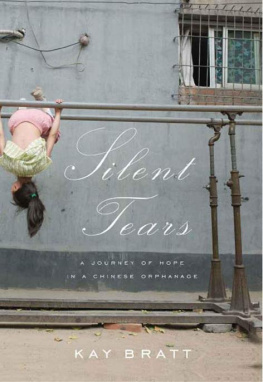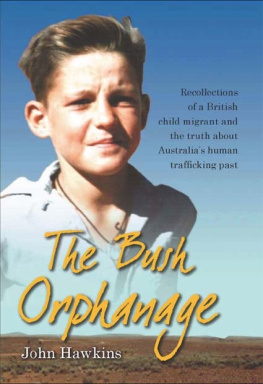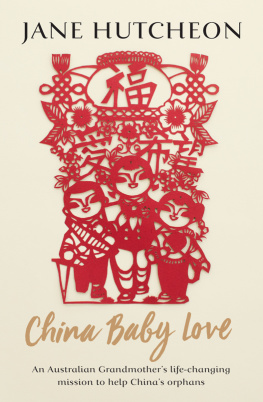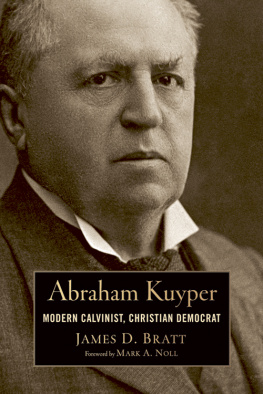All rights reserved.
No part of this book may be reproduced, or stored in a retrieval system, or transmitted in any form or by any means, electronic, mechanical, photocopying, recording, or otherwise, without express written permission of the publisher.
Produced by Melcher Media, Inc.
124 West 13th Street
New York, NY 10011
www.melcher.com
This novel was originally published, in a slightly different form, by Booksurge in 2009.
DEDICATED TO CHINA'S ORPHANS.
YOU ARE NOT FORGOTTEN.
Introduction
A two-year-old child dangling precariously from a third-story window...a little boy tied to a chair for hours...abandoned children begging for a crust of bread...most of us will live our entire lives without witnessing such blatant cases of emotional or physical child neglect and abuse. Instead, we live in relative comfort, far removed from such horrors and perhaps feeling we are doing our part to help suffering children by sending an annual tax-deductible check to some charitable organization. While this is certainly a worthy undertaking, there is much more that needs to be brought to the world's attention and addressed.
I used to be one of those people, sympathizing at a distance with the plight of less-fortunate humans the world over while tending to my own personal dramas in my middle-class neighborhood in Greyhill, South Carolina.
I was perfectly content for my family to continue its slow crawl toward the American dream--or so I thought. I am not an overly adventurous woman. My idea of a daring journey is lying on the beach with a thick novel while protecting my children from the dangers of sunburn.
However, fate had other plans for me. Late in 2002, I learned I would not be lingering in my safe and easy life much longer. When my husband Ben's company offered him a management position starting up a manufacturing facility in a third world country, we were both excited and terrified. Our families thought we had lost our minds when we accepted and began planning our move to China, a land that then seemed mysterious and wonderful to us. I always believed God had a plan for us, and I quickly realized that this could be my chance to do something memorable with my life. Immediately I set three goals: to learn to speak Mandarin, to volunteer in an orphanage, and to chronicle my time overseas by keeping a journal.
Our lives changed dramatically in 2003, when, after months of anticipation and preparation, we relocated to Shengxi. We embarked on this journey fully realizing it was going to be an unforgettable experience; we just never bargained for the adventure to be so fraught with frustration and turmoil. Once we arrived, the culture shock and isolation we faced were overwhelming. After several weeks, we believed we had made a terrible mistake by leaving our simple, untroubled lives in America. It was a far more difficult transition than any of us had anticipated.
The often nerve-racking, trying times and sometimes extraordinary adventures left us emotionally drained. Even after a few months, my family was not adjusting in the way I had imagined. My young daughter, Amanda, constantly begged to return to the States, and Ben was struggling with the many cultural differences of managing a Chinese business.
Our commitment of eighteen months began to feel like a prison sentence, and my family looked to me to make it all better. At the five-month mark, I knew we needed to pull ourselves out of our mostly self-imposed misery before it turned us against our circumstances and one another. We had resisted enrolling Amanda in school, but once we did, we realized it was the best decision for all of us. Among peers, she began to blossom and return to her extroverted self. A few months later, a little girl moved in to the house next to ours, and she and Amanda instantly became best friends. Knowing Amanda was adjusting helped Ben and me to begin to relax and come to grips with our new circumstances.
With the help of an expatriate friend who had contacts with city officials, I was eventually accepted as a volunteer by the local orphanage. Thrilled and a little frightened, I started out as a hesitant observer, but after experiencing the shock and horror of finding a tiny baby dead from neglect in her crib, I had to decide whether I was going to fight this outrage and try to make a difference or turn a blind eye to protect my delicate position as a foreigner. I left the orphanage that day profoundly discouraged at the utter disregard for human life, yet filled with an exhilarating sense of purpose I had never known before.
At this crossroads in my life, I saw clearly the challenge placed before me. I was driven to try to change the lives of these children whose parents had cast them aside like the day's garbage. I wanted to transform the often vacant, detached expressions on their innocent faces to ones of animation, of joy, of life. My new goal became demonstrating to each child how it felt to be loved and nurtured. I put behind me the memories of my comfortable life in America and threw myself wholeheartedly into my work at the orphanage and my task of making Shengxi a real home for our family.
Using email correspondence and an expatriate website, I began to raise community awareness of these helpless children's miserable existence. Gradually, I began building the volunteer group, one person at a time. Friends and family forwarded my weekly email updates to more and more people, and the trickle of donations that began to arrive helped us to implement many changes at the orphanage. On occasional visits to the States, I spoke at churches and further broadened our support group. Time passed imperceptibly quickly, and I was soon busy coordinating the volunteer schedule, surgeries, and incoming donations.
Silent Tears: A Journey of Hope in a Chinese Orphanage is a collection of my journal entries during my family's time in China. My memoir shows the vast range of emotions I faced during our four-year assignment in China. Countless times, I wanted to quit everything and jump on a plane back to the U.S. Some of the cases of abuse and neglect were so severe they caused me to spiral downward into depression. However, because of the bonds I had formed with so many of the children, I simply could not bring myself to walk away. After a time, I became an expert at hiding the anguish I felt after each death--each entirely preventable death--of one of our babies. I learned through practice to summon an inner strength and stoicism that enabled me to push on.
Some of the children we nurtured went on to become part of "forever families" and to live normal, happy lives. Not all were so lucky. The faces of many children destined to remain in the orphanage--many of whom I deeply loved--return at random to haunt my days and occasionally my dreams. Often, particularly at the beginning of my mission, I would come across a child or baby in distress, tears flowing down his or her cheeks, but unable to utter a sound. I would never fail to be astonished that a child so young could cry so silently, without movement or expression, while so clearly craving human touch. It was as though they had given up on the hope of receiving even a moment of comfort or attention to alleviate the misery of their prisonlike existence. Those memories will linger forever in the corners of my heart. I titled this memoir Silent Tears as a tribute to the Shengxi orphanage children, now and in the future.










